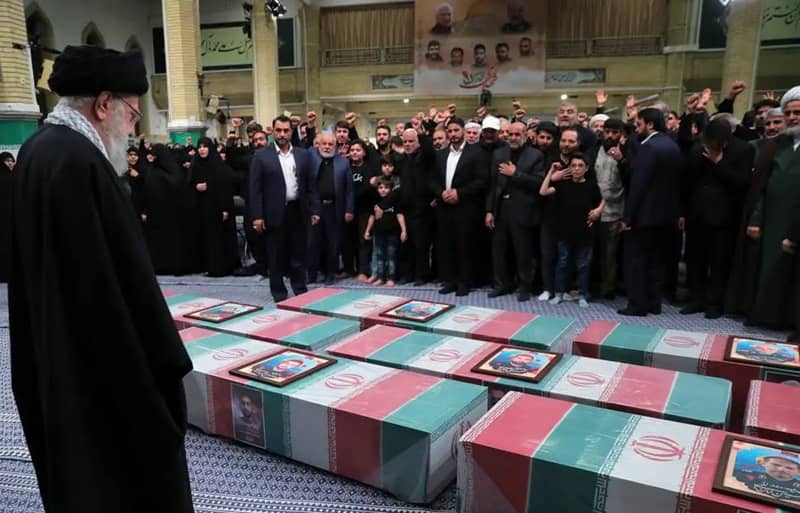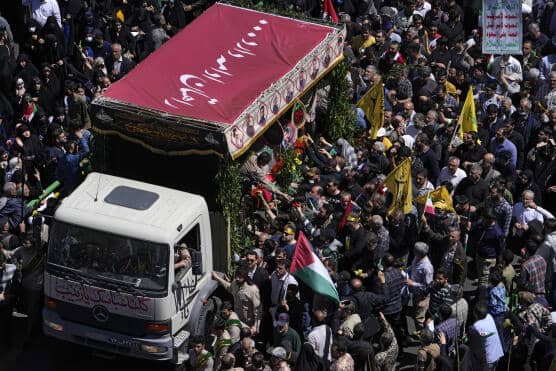Following the destruction of its consulate in Damascus, Syria, by an alleged Israeli missile strike that claimed the lives of seven individuals, including a top commander and his deputy, Iran has vowed to retaliate.
The Islamic Revolutionary Guards Corps (IRGC) claimed in a statement that two of its senior commanders, Brigadier General Mohammad Reza Zahedi and his deputy General Mohammad Hadi Hajriahimi, were slain in the strike on Monday.
Israel has frequently attacked Iran’s military facilities in Syria as well as those of its allies, but this attack on Monday marked the first time the embassy compound itself was the target.
Time of attack
Near the main embassy building in the Mezzeh neighborhood of Damascus, the consulate was attacked on Monday at approximately 5:00 p.m. (14:00 GMT).
Images from the scene showed twisted steel and piles of debris, and close by, an Iranian flag was still flying from a pole.
Who were the target?
According to an IRGC statement, seven IRGC military advisers were slain when the attack occurred while they were inside the premises.
According to the statement, Hajriahimi and Zahedi were among the deceased.
According to the statement, Zahedi led the Quds Force in Syria and Lebanon until 2016.

As many as eleven persons, including eight Iranians, two Syrians, and one Lebanese, all of them were fighters, have been murdered, according to the Syrian Observatory for Human Rights, a war monitor located in the United Kingdom.
Iran’s response
Hossein Akbari, Iran’s ambassador to Syria, predicted a “decisive” retaliation from Tehran despite not being hurt in the incident.
Hossein Amirabdollahian, Iran’s foreign minister, attributed the strike on Israel and characterized it as “a violation of all international obligations and conventions.”
Iran “reserves the right to carry out a reaction and will decide on the type of response and the punishment of the aggressor,” Foreign Ministry spokesperson Nasser Kanani stated in a separate statement.
The hit was deemed a “flagrant violation of the United Nations Charter, international law, and the foundational principle of the inviolability of diplomatic and consular premises,” according to Iran’s UN mission.
The Iranian delegation asked the UN Security Council to denounce the attack, seeing the strike as “a significant threat to regional peace and security” and stating that Tehran had the right “to take a decisive response.”
Tehran’s streets were filled with demonstrators denouncing Israel for the strike.
Reaction of others
Syria claimed that the strike had killed “innocents.”
“We strongly condemn this horrific terrorist attack that targeted the Iranian consulate building in Damascus and resulted in the deaths of numerous innocent people,” stated Syrian Foreign Minister Faisal Mekdad, who accompanied Syria’s Interior Minister to the scene of the attack.
President Bashar al-Assad’s ally Russia also joined the chorus of denunciation.
Russia’s Foreign Ministry released a statement saying, “We strongly condemn this unacceptable attack against the Iranian consular mission in Syria.”

Iran-backed Hezbollah in Lebanon issued a warning, claiming that Israel will foot the bill for the strike.
In support of its ally Hamas, Hezbollah has engaged Israel in almost daily cross-border fire exchanges since the Gaza War broke out in October.
Hezbollah declared in a statement on Tuesday that “this crime will certainly not pass without the enemy receiving punishment and revenge.” “One of the first to support, sacrifice, and persevere for many years to develop and advance the work of the resistance [Hezbollah] in Lebanon,” the statement continued, was Zahedi.
The incident was denounced by Muslim nations as well, including Saudi Arabia, the United Arab Emirates, Pakistan, Qatar, Jordan, Oman, and Iraq.
Meanwhile, US State Department spokesman Matthew Miller informed reporters that Washington is still “aware of anything that could escalate or lead to a rise in conflict in the region.”
“We do not comment on reports in the foreign media,” an Israeli military spokesperson told reporters in response to questions regarding the incident.
Four unidentified Israeli officials were quoted by the New York Times as admitting that Israel was behind the strike.
Iran’s response to the threat
The incident seemed to indicate a step up in Israel’s targeting of Iranian military personnel, as Iran arms and finances extremist groups that oppose Israel in Gaza and along its border with Lebanon.
However, experts don’t seem to agree on whether the move would spark a regional conflict.
According to Washington, DC-based Jon Alterman of the Center for Strategic and International Studies, Israel most likely viewed the strike as a deterrent.
He stated, “The Israelis are certain that if they try to retreat, the threat will increase rather than decrease.” “They are convinced that their enemies will be deterred as long as they do something like this periodically.”
But there was a risk of escalation, according to Steven Cook, an expert at the Council on Foreign Relations in Washington.
He stated, “The IRGC can relax restrictions on proxies in Iraq and Syria, putting American forces in danger once more.” “The Iranians may also order Hezbollah to intensify its increasingly audacious and frequent attacks against Israel.”
Later on Monday, a drone attack on a naval facility in southern Israel was “directed by Iran,” according to Israel’s army chief spokesman Daniel Hagari, and no casualties were reported.
The Israeli military reported early on Tuesday that a rocket fired from Syria at Israel had crashed short of its intended target.
The director of the Iran Project at the International Crisis Group, Ali Vaez, acknowledged that there was a chance for the conflict to spread but suggested Israel might not be overly concerned about it.
“This puts Israel in a win-win situation because Israel knows that Iran does not want to be drawn into a regional war. Therefore, if Israel escalates its attacks against Iranian personnel and assets in Syria, it is likely to do so without incurring any costs, and if Iran does retaliate, it will have a legitimate reason to justify escalating the conflict.”